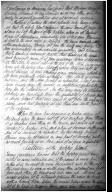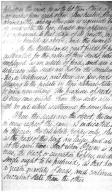[ Obtaining Opium in America / Culture of the Poppy Plant ] Dr. William James Almon
Date: Late 18th century; exact date unknown.
Source:
Manuscript Notebook of Dr. William James Almon
Institution: Nova Scotia Archives
| Source Origin: Almon Family Fonds
| Reference: MG 1 / Microfilm Reel 10,045
Directions and observations on poppy cultivation in America and the Netherlands, pp. 246-47. Original source unknown.
A gentleman in America, has found that Opium may be
as easily obtained in our climates as in any other, and pro
-bably in as great quantities and at a small expence.
Instead of cutting the seed capsule only, having observ
-ed that the whole plant contained the same kind of juice, he
at once cut off the head of the poppy, when in its highest
degree of succulence, immediately after it had done flowering,
as close to the seed vessel as possible: the juice immediately
after amputation, springs out from the neck very freely. It
soon accumulates in considerable quantity, and becomes a
thick, darkish coloured paste, that heals up the wound,
and prevents more of it from exuding. When it has attain
-ed this state, he again cuts off the top of the stem, carrying
home all the pieces thus cut off, where they are left to
dry at leisure. A fresh bleeding again commences, which in
its turn gradually stops as before. The stalk is again
cut over, and the same process is repeated, as long as any
juice exudes from the wound, in sufficient quantity to
pay for the collecting it. In this way may be obtained
perhaps an hundred times the quantity of opium from
a single plant, that ever could be got from the capsules
alone, and that perhaps at less than one tenth part
of the expence.
When the juice has acquired a proper degree of
thickness upon the pieces cut off, it is scraped from them,
it is scraped from them in the house, and made up into
lumps of a proper size, and when it becomes sufficiently
dry it is carried to market. [-]ry this simple process.
Opium may be obtained in any part of Europe, with
as much facility as in Asia, and of as good a quality.
Culture of the poppy plant
Every gardener knows that the poppy grows very
easily in every cultivated soil, if the ground be made fine, (the
richer it is, no doubt the more luxuriant will be the crop,)
the seeds may be sown in drills, very thin, at about one foot
from each other; the plants will soon come up. As soon as
weads appear, let the intervals between the rows, be hoed
with a hand hoe. When the weeds begin again to appear,
let it be hoed a second time; and now thin out the
plants in the rows, so as to let them stand at not less than
six inches from each other. Thus treated, they will prosper
abundantly, and no other care is required but to keep down
all weeds with the hoe, should any appear. After the plant
has advanced to that stage of its growth, indicated before,
let it be treated as above, and the business is finished.
In the Netherlands, great fields of poppies are
cultivated for the sake of their seeds, which are there
employed as an article of food, and are esteemed a great
delicacy. The seeds are not in the smallest degree narco
-tic, or deleterious, and there are few seeds more generally
pleasing to the palate in their natural state, or thought to
be more nourishing. The produce of seeds from an acre
is very considerable. From these seeds also may be extract
-ed an oil which is esteemed for some purposes.
Where the seeds are the object, the culture should be
in every respect the same as indicated above. But
in this case, the tall white poppy only, should be reared,
as the pods of this kind are large and all ripen nearly
at the same time. But when Opium is the object in
view, the black or carnation poppy, whether double or
single ought to be preferred, as that kind produces
a greater quantity of seeds, and continues longer in a
succulent state than the other.
Download: Transcription | Images

